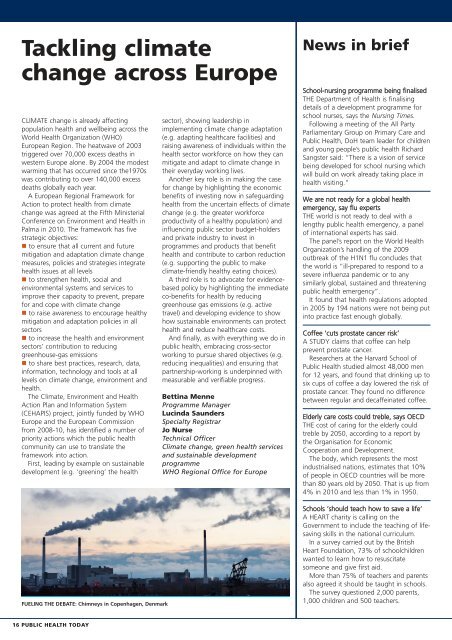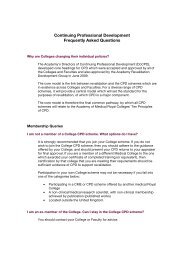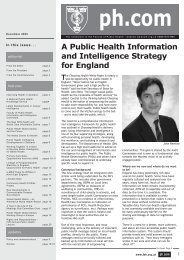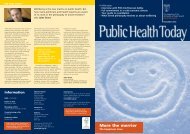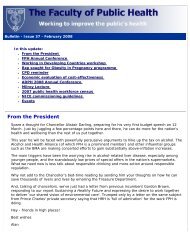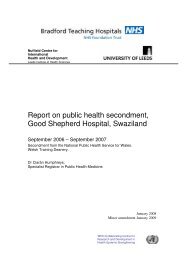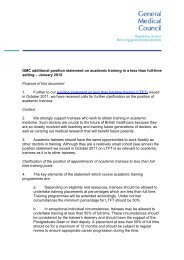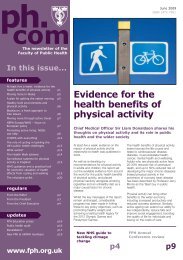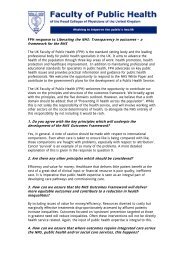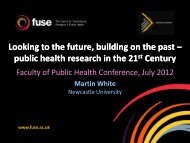PHT June 2011_Jan 10 - UK Faculty of Public Health
PHT June 2011_Jan 10 - UK Faculty of Public Health
PHT June 2011_Jan 10 - UK Faculty of Public Health
Create successful ePaper yourself
Turn your PDF publications into a flip-book with our unique Google optimized e-Paper software.
Tackling climate<br />
change across Europe<br />
CLIMATE change is already affecting<br />
population health and wellbeing across the<br />
World <strong>Health</strong> Organization (WHO)<br />
European Region. The heatwave <strong>of</strong> 2003<br />
triggered over 70,000 excess deaths in<br />
western Europe alone. By 2004 the modest<br />
warming that has occurred since the1970s<br />
was contributing to over 140,000 excess<br />
deaths globally each year.<br />
A European Regional Framework for<br />
Action to protect health from climate<br />
change was agreed at the Fifth Ministerial<br />
Conference on Environment and <strong>Health</strong> in<br />
Palma in 20<strong>10</strong>. The framework has five<br />
strategic objectives:<br />
n to ensure that all current and future<br />
mitigation and adaptation climate change<br />
measures, policies and strategies integrate<br />
health issues at all levels<br />
n to strengthen health, social and<br />
environmental systems and services to<br />
improve their capacity to prevent, prepare<br />
for and cope with climate change<br />
n to raise awareness to encourage healthy<br />
mitigation and adaptation policies in all<br />
sectors<br />
n to increase the health and environment<br />
sectors’ contribution to reducing<br />
greenhouse-gas emissions<br />
n to share best practices, research, data,<br />
information, technology and tools at all<br />
levels on climate change, environment and<br />
health.<br />
The Climate, Environment and <strong>Health</strong><br />
Action Plan and Information System<br />
(CEHAPIS) project, jointly funded by WHO<br />
Europe and the European Commission<br />
from 2008-<strong>10</strong>, has identified a number <strong>of</strong><br />
priority actions which the public health<br />
community can use to translate the<br />
framework into action.<br />
First, leading by example on sustainable<br />
development (e.g. ‘greening’ the health<br />
FUELING THE DEBATE: Chimneys in Copenhagen, Denmark<br />
sector), showing leadership in<br />
implementing climate change adaptation<br />
(e.g. adapting healthcare facilities) and<br />
raising awareness <strong>of</strong> individuals within the<br />
health sector workforce on how they can<br />
mitigate and adapt to climate change in<br />
their everyday working lives.<br />
Another key role is in making the case<br />
for change by highlighting the economic<br />
benefits <strong>of</strong> investing now in safeguarding<br />
health from the uncertain effects <strong>of</strong> climate<br />
change (e.g. the greater workforce<br />
productivity <strong>of</strong> a healthy population) and<br />
influencing public sector budget-holders<br />
and private industry to invest in<br />
programmes and products that benefit<br />
health and contribute to carbon reduction<br />
(e.g. supporting the public to make<br />
climate-friendly healthy eating choices).<br />
A third role is to advocate for evidencebased<br />
policy by highlighting the immediate<br />
co-benefits for health by reducing<br />
greenhouse gas emissions (e.g. active<br />
travel) and developing evidence to show<br />
how sustainable environments can protect<br />
health and reduce healthcare costs.<br />
And finally, as with everything we do in<br />
public health, embracing cross-sector<br />
working to pursue shared objectives (e.g.<br />
reducing inequalities) and ensuring that<br />
partnership-working is underpinned with<br />
measurable and verifiable progress.<br />
Bettina Menne<br />
Programme Manager<br />
Lucinda Saunders<br />
Specialty Registrar<br />
Jo Nurse<br />
Technical Officer<br />
Climate change, green health services<br />
and sustainable development<br />
programme<br />
WHO Regional Office for Europe<br />
News in brief<br />
School-nursing programme being finalised<br />
THE Department <strong>of</strong> <strong>Health</strong> is finalising<br />
details <strong>of</strong> a development programme for<br />
school nurses, says the Nursing Times.<br />
Following a meeting <strong>of</strong> the All Party<br />
Parliamentary Group on Primary Care and<br />
<strong>Public</strong> <strong>Health</strong>, DoH team leader for children<br />
and young people’s public health Richard<br />
Sangster said: “There is a vision <strong>of</strong> service<br />
being developed for school nursing which<br />
will build on work already taking place in<br />
health visiting.”<br />
We are not ready for a global health<br />
emergency, say flu experts<br />
THE world is not ready to deal with a<br />
lengthy public health emergency, a panel<br />
<strong>of</strong> international experts has said.<br />
The panel’s report on the World <strong>Health</strong><br />
Organization’s handling <strong>of</strong> the 2009<br />
outbreak <strong>of</strong> the H1N1 flu concludes that<br />
the world is “ill-prepared to respond to a<br />
severe influenza pandemic or to any<br />
similarly global, sustained and threatening<br />
public health emergency”.<br />
It found that health regulations adopted<br />
in 2005 by 194 nations were not being put<br />
into practice fast enough globally.<br />
C<strong>of</strong>fee ‘cuts prostate cancer risk’<br />
A STUDY claims that c<strong>of</strong>fee can help<br />
prevent prostate cancer.<br />
Researchers at the Harvard School <strong>of</strong><br />
<strong>Public</strong> <strong>Health</strong> studied almost 48,000 men<br />
for 12 years, and found that drinking up to<br />
six cups <strong>of</strong> c<strong>of</strong>fee a day lowered the risk <strong>of</strong><br />
prostate cancer. They found no difference<br />
between regular and decaffeinated c<strong>of</strong>fee.<br />
Elderly care costs could treble, says OECD<br />
THE cost <strong>of</strong> caring for the elderly could<br />
treble by 2050, according to a report by<br />
the Organisation for Economic<br />
Cooperation and Development.<br />
The body, which represents the most<br />
industrialised nations, estimates that <strong>10</strong>%<br />
<strong>of</strong> people in OECD countries will be more<br />
than 80 years old by 2050. That is up from<br />
4% in 20<strong>10</strong> and less than 1% in 1950.<br />
Schools ‘should teach how to save a life’<br />
A HEART charity is calling on the<br />
Government to include the teaching <strong>of</strong> lifesaving<br />
skills in the national curriculum.<br />
In a survey carried out by the British<br />
Heart Foundation, 73% <strong>of</strong> schoolchildren<br />
wanted to learn how to resuscitate<br />
someone and give first aid.<br />
More than 75% <strong>of</strong> teachers and parents<br />
also agreed it should be taught in schools.<br />
The survey questioned 2,000 parents,<br />
1,000 children and 500 teachers.<br />
16 PUBLIC HEALTH TODAY


